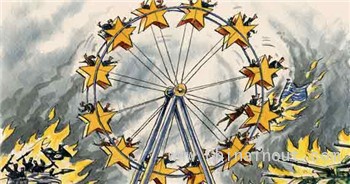幾年前,,我聽一位歐洲政客在飯后發(fā)表了一次演講,他不僅在本國的政治生活中發(fā)揮著領(lǐng)導(dǎo)作用,,還在歐盟(EU)的委員會中擔(dān)任要職,。當(dāng)晚,這位政客對歐洲的價值觀(文化,、團(tuán)結(jié))及其制度的質(zhì)量大加贊賞,,得到了聽眾的普遍認(rèn)同。他接著強(qiáng)調(diào)了歐盟更廣泛推廣這些價值觀以及制度的必要性,。
一些與我坐在同桌的人和我一樣尷尬不已,。讓我難受的是,類似的話我也可以塞到世界歷史上一些最不受歡迎的人物嘴里,。這位政客描述的歐盟是一個帝國主義計劃,。炫耀大英帝國的人們曾經(jīng)唱道:“你的疆土?xí)絹碓綇V,讓你變得強(qiáng)大的上帝會讓你變得更強(qiáng)大,。”英國人或許還會唱“希望與榮耀之國”(Land of Hope and Glory),,但他們對于歌詞已不再當(dāng)真。然而,,歐盟擴(kuò)張的遠(yuǎn)景也是如此,。
對于現(xiàn)代歐洲的締造者來說,,更廣泛的同盟與更緊密的同盟同樣重要。歐盟在希臘結(jié)束軍事統(tǒng)治后倉促接受其加入歐盟,,希望該國維持其脆弱的民主制度,;西班牙和葡萄牙也很快被準(zhǔn)許加入。所有后共產(chǎn)主義國家,,只要有誠實(shí)程度說得過去的民主制度(有的連這個也沒有),,都獲得了入盟許可。創(chuàng)建法國和德國貨幣聯(lián)盟的雄心勃勃的計劃擴(kuò)大了范圍,,降低了加入標(biāo)準(zhǔn),,把大多數(shù)歐盟成員國包括在內(nèi)。加入歐盟的主要條件變成了愿意,。
當(dāng)然,,21世紀(jì)的歐洲與19世紀(jì)和20世紀(jì)的帝國有著巨大差異:特別是,傳統(tǒng)的帝國主義者不尋求被殖民者的同意,,同時它們壓制多數(shù)民主表達(dá)形式。然而,,如今希臘可能不會認(rèn)為兩者之間的差異特別大,。
因此,問題是,,與歷史上很多帝國主義計劃一樣,,歐洲一體化的地域界限是否超越了它能夠合理維持的限度。歐盟如今面臨的兩個關(guān)系存亡的問題突顯出這點(diǎn):與俄羅斯的地緣政治沖突,,以及外圍經(jīng)濟(jì)體與歐元區(qū)之間的緊張關(guān)系,。
除了1941-42年納粹占領(lǐng)歐洲大部分領(lǐng)土的時候(人們最好忘記這個先例),西歐邊界向東推進(jìn)已達(dá)到歷史最遠(yuǎn),。烏克蘭危機(jī)考驗(yàn)的是,,如此大規(guī)模的政治、經(jīng)濟(jì)和最終的軍事支持的隱含承諾,,在被要求兌現(xiàn)時能在多大程度上得到保持,。波羅的海國家有合理理由對新盟友承諾的可靠性感到擔(dān)憂。
現(xiàn)在幾乎無人可以質(zhì)疑這點(diǎn):一開始讓希臘加入歐元區(qū)是一個錯誤,。這不僅僅是一個經(jīng)濟(jì)問題:捏造數(shù)據(jù),、揮霍過度以及無法償還債務(wù)。希臘的核心問題是該國的政治制度不夠成熟,,無法實(shí)施有力的國家治理或經(jīng)濟(jì)管理,,也無法以負(fù)責(zé)任的方式與西歐機(jī)構(gòu)合作。希臘并非歐盟唯一一個可以適用這種批評的成員國,。
歷史上的帝國通常都是因?yàn)檫^度擴(kuò)張而滅亡,,過度擴(kuò)張會導(dǎo)致外圍國家人口難以駕馭,接著導(dǎo)致擴(kuò)張計劃的合理性在本國內(nèi)遭到質(zhì)疑。如今,,歐洲也可見這些征兆,。歐盟一直以來取得成功的途徑是,總比歐盟機(jī)構(gòu)能夠游刃有余地支持,、或人民準(zhǔn)備好接受的水平更多一點(diǎn)和更快一點(diǎn)地推動一體化,。或許這項(xiàng)雄心勃勃的戰(zhàn)略現(xiàn)在已經(jīng)走得太遠(yuǎn)了,。(中國進(jìn)出口網(wǎng))

A few years ago, I heard an after-dinner speech from a European statesman, a person who has played a leading role not only in the political life of his own country but in the councils of the EU. The speaker that evening lauded, to general agreement, Europe’s values — its culture, its solidarity — and the quality of its institutions. He went on to stress the need for the unio to propagate these values and institutions more widely.
The discomfiture I felt was shared by some of those sitting with me at the table. My problem was that I could have put similar words into the mouths of some of the most unpleasant figures in world history. The EU that the speaker described was an imperialist project. Those who proclaimed the British empire used to sing: “Wider still, and wider, may thy bounds be set. God who made thee mighty, make thee mightier yet.” Britons may still sing “Land of Hope and Glory” but they no longer take the words seriously. Yet the expansion of the EU embraced a similar vision.
For the builders of modern Europe, wider unio has been as important as closer unio. Greece was hastily admitted in the hope of sustaining its fragile democracy after the end of military rule; Spain and Portugal followed soon after. Every post-communist state with passably honest and democratic institutions, and some without, has secured admission. The ambitious project of creating monetary unio between France and Germany was extended, by lowering admission standards, to include most EU members. The principal qualification for membership of a European club has been the desire to join.
Of course, there are big differences between the Europe of the 21st century and the empires of the 19th and 20th: notably, traditional imperialists did not seek the consent of those they colonised and they suppressed most forms of democratic expression. Yet Greeks today might not perceive these differences as being particularly large.
So the question is whether, like so many imperialist projects throughout history, the European project has stretched its territorial boundaries beyond the limits it can plausibly sustain. That question is highlighted by the two existential problems the EU faces today: the geopolitical confrontation with Russia, and the troubled relationship between peripheral economies and the eurozone.
The boundaries of western Europe have been pushed as far east as at any time in history, save for the best forgotten precedent of the Nazi occupation of most of the continent in 1941-42. The Ukraine crisis tests how far implied promises of political, economic and ultimately military support in that extension will be maintained when called on. The Baltic states have reasonable cause to feel nervous about the solidity of the commitment of their new allies.
Few people can now doubt that it was a mistake to let Greece join the euro in the first place. And this is not just a matter of economics — the fudged data, profligate spending and unpayable debts. The central Greek problem is that the country’s political institutions are not sufficiently mature to effect competent administration or economic management, or to engage in a responsible manner with the institutions of western Europe. And Greece is not the only member state of the EU to which that critique could be applied.











